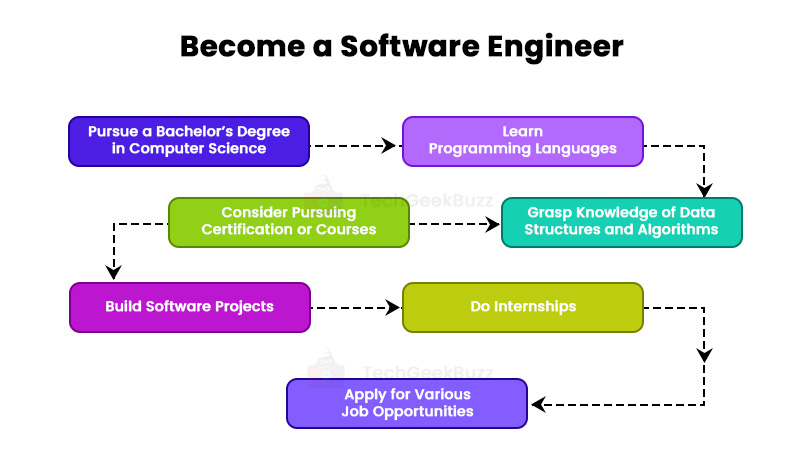In the world of programming, we often come across the term software engineer. When we hear the term software engineer, we always think of a person sitting for long hours in front of a computer and coding. Seems boring, right? Though software engineers seem boring, they are the masterminds behind software applications we use these days.
Software engineers are among the IT professionals who receive the highest pay scales. Not only the role of software engineers is rewarding in terms of pay scales but also in terms of job opportunities. With the emergence of multiple software development companies and organizations in the last decade, the demand for software engineers has grown more extensively than ever before.
So, if you are someone who enjoys working with computers and is enthusiastic about learning new technology, a software engineer is surely your cup of tea. But as a novice in the programming world, you may not be aware of how to become a software engineer.
Well, this article guides you on how to become a software engineer. Also, it highlights a brief discussion on who exactly a software engineer is.
Who is a Software Engineer?

A software engineer is an Information Technology (IT) specialist who is in charge of putting the software engineering principles into practice throughout the software development life cycle (SDLC). Right from the concept initiation to the deployment and maintenance of software applications, the role of software engineers is crucial.
They are the ones who decide which programming language to employ, what platform and architecture to use, which IDEs or libraries are required, and many other aspects involved in software development . Moreover, the role of software engineers is not only limited to developing software applications but also expands in the development of computer games, operating systems, and network control systems.
Besides developing their own software systems, software engineers also evaluate, improve, and maintain software systems developed by others.
How to Become a Software Engineer?
It is obvious to get confused as a beginner about where to start or which path to follow to become a software engineer. Here, we have listed a general path that will guide every newbie on how to become a software engineer.

1. Pursue a Bachelor’s Degree in Computer Science
These days, most tech giants have prerequisites for software engineers to hold a bachelor’s degree in computer science or any other related field. This is because individuals will gain a thorough knowledge of all the major computer science subjects in four years.
These subjects include data structure and algorithms, various programming languages, computer architecture, operating systems, databases, computer networks, software engineering, and many more.
So earning a bachelor's degree is always a better choice if you want to work as a software engineer. However, the problem is that pursuing a bachelor’s degree will only provide theoretical knowledge. To implement the gained knowledge or have a practical understanding of the concepts, you need to work on multiple projects or opt for pursuing a course or certification.
For those who don’t opt for pursuing a bachelor’s degree, they can go with some online courses or bootcamps that help them gain the fundamental knowledge of computer science subjects.
2. Learn Programming Languages
Programming languages are necessary in order for us to interact with computer systems or other digital devices, much as humans communicate with one another through a variety of languages. Though you learn various programming languages while pursuing a bachelor’s degree, it is essential for you to choose one or two of them and have a grip on them.
It is better to go with the trend, meaning that it is beneficial to learn the top programming languages, such as Python, Java, C, C++, Ruby, Perl, JavaScript, HTML/CSS, R, etc. Make sure, though, that you only learn one programming language at a time and go on to the next once you have mastered it. If you attempt to learn and master two to three languages at once, it may create a mess in your head.
You might be wondering at this point, as a beginner, what specifically you should study about programming languages. Learn the syntax of the language, experiment with developing various programs after you've mastered the syntax, and then go on to solve other challenging issues. Additionally, make yourself familiar with the various IDEs, libraries, and frameworks available for the programming language you are learning.
Furthermore, there are a galore of online platforms available out there to practice coding problems in programming languages you are comfortable with. These platforms include CodeChef, Coderbyte , HackerRank , LeetCode , and many others.
3. Grasp Knowledge of Data Structures and Algorithms
Along with programming languages, data structures and algorithms are other concepts at the heart of programming. An algorithm is a group of sequential instructions that are to be executed to solve a specific problem. Meanwhile, a data structure is an approach to organizing data in a structured manner in a computer system so that it becomes easy to access and manage it.
The keys to tackling any difficult problem with less time and memory are data structures and algorithms. As a software engineer, it would be your responsibility to provide an efficient solution to a particular business problem by taking memory and time into consideration.
To have strong knowledge of data structures, you can check out the tutorial here .
Like programming languages, you can practice data structures and algorithms problems on various online platforms.
4. Consider Pursuing Certification or Courses
Despite having a bachelor's degree, it would be wise to enroll in or earn a certification in a programming language of your interest. Any certification course you participate in will provide you the chance to work on a variety of projects and put theoretical concepts into reality. As a result, you will be proficient in programming languages.
Moreover, a certification acts as proof of your skills. It demonstrates your expertise in a particular programming language and increases your credibility.
As technology evolves rapidly, it is not enough to just earn a certification. You need to stay current on technological trends and advancements. For this, you can join online communities and forums, watch YouTube videos, read the latest articles and blogs related to technology, and try practicing coding problems to enhance problem-solving skills.
5. Build Software Projects
There is no doubt that employers will ask you about your experience in developing projects, whether they may be simple or complex, based on your expertise and level of experience working in the industry. Learning computer science subjects is of no use unless you implement them in the real world.
Therefore, after learning every programming language, try to build the projects in it by leveraging all other available technologies, like databases, IDEs, libraries and frameworks . In addition, you can even think of contributing your skills to some open-source projects.
Whatever you develop, create a portfolio and mention everything about your work there. This will allow you to demonstrate your skills and experience to potential employers.
6. Do Internships
If you are a newbie, doing an internship would be a great choice since you can gain hands-on experience working with various technologies. Many small start-ups and large-scale organizations hire freshers for internships where they can gain practical training and work on some real-world projects. When you gain experience from internships, it becomes pretty easy to find a full-time job.
Internships not only help students learn practical technical skills but also provide an understanding of how to work with a team as well as the workplace and culture of the company.
Generally, students opt for internships during their college time, which lasts for three to six months, so they get job-trained and hired by renowned companies immediately after graduation.
7. Apply for Various Job Opportunities
Once you do an internship and build a perfect portfolio of your work, the next step is to create an impactful resume and post them on various job portals. You can even visit a particular company’s official website and apply there from the careers section.
Make sure to include a link to your portfolio as well as an internship experience on your resume. Both an internship and your portfolio speak a lot about your skills when you go for an interview. Alongside, mention all the expertise you possess in your resume.
During an interview, make sure to answer the questions you know confidently. You can expect questions on the skills, developed projects, and experience you mention in your resume.
Conclusion
This was all about a general and typical approach to becoming a software engineer. Earning a bachelor’s degree in computer science or a related field is one of the options to which opting for an online Bootcamp is an alternative. However, many companies set holding a bachelor’s degree as their prerequisite. As a result, choosing to pursue a bachelor's degree is usually advantageous.
Besides, make sure to learn and master all the essential software engineer skills and go for gaining experience before applying for a job.
We hope you find this article insightful. Good Luck!
People are also reading:
- What is Software Engineering?
- Software Developer Salary
- How to Become a Data Engineer?
- Software Development Process
- Software Development Tools
- How to Become a Software Developer?
- How to Become a Machine Learning Engineer?
- Top Programming Languages
- What is an Operating System?
- Data Structure and Algorithm Courses




